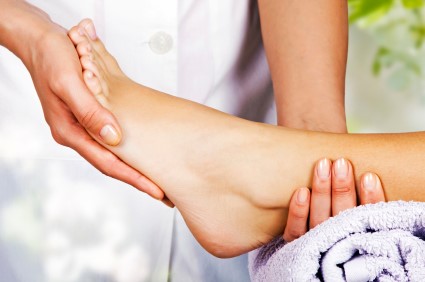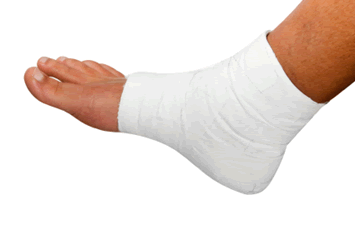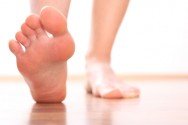December 2015
Orthotics Help With Overall Body Structure
 Choosing the right orthotics for your feet can help with the support of your overall body structure, and the process of creating orthotics is relatively simple and easy. Kevin Wong, DC, suggests determining the right orthotics length size for patients’ shoes. There are two different methods to constructing the orthotics, the non-weight-bearing method and the weight-bearing method. In the non-weight-bearing method, plaster material is molded around the foot to create a negative impression, which is then used to form the orthotic. In the weight-bearing method, patients’ feet can be scanned for certain measurements, which can then be applied to the construction of custom-made orthotics.
Choosing the right orthotics for your feet can help with the support of your overall body structure, and the process of creating orthotics is relatively simple and easy. Kevin Wong, DC, suggests determining the right orthotics length size for patients’ shoes. There are two different methods to constructing the orthotics, the non-weight-bearing method and the weight-bearing method. In the non-weight-bearing method, plaster material is molded around the foot to create a negative impression, which is then used to form the orthotic. In the weight-bearing method, patients’ feet can be scanned for certain measurements, which can then be applied to the construction of custom-made orthotics.
If you are having discomfort in your feet and would like to try orthotics, contact one of our podiatrists of University Foot and Ankle Center, L.L.C. Our doctors will treat your foot and ankle needs.
What are Orthotics?
Orthotics are inserts you can place into your shoes to help with a variety of foot problems such as flat feet or foot pain. Orthotics provide relief and comfort for minor foot and heel pain, but can’t correct serious biomechanical problems in your feet.
Over-the-Counter Inserts
Orthotics come in a wide variety of over-the-counter inserts that are used to treat foot pain, heel pain, and minor problems. For example, arch supports can be inserted into your shoes to help correct over arched or flat feet, while gel insoles are often used because they provide comfort and relief from foot and heel pain by alleviating pressure.
Prescription Orthotics
If over-the-counter inserts don’t work for you, or if you have a more severe foot issue, it is possible to have your podiatrist prescribe custom orthotics. These high quality inserts are designed to treat problems such as abnormal motion, plantar fasciitis, and more severe heel pain. They can even be used to help patients suffering from diabetes by treating foot ulcers and painful calluses, and are usually molded to your feet individually, which allows them to provide full support and comfort.
If you are experiencing minor to severe foot or heel pain, it’s recommended to speak with your podiatrist on the possibilities of using orthotics. A podiatrist can determine which type of orthotic is right for you and allow you to take the first steps towards being pain free.
If you have any questions please feel free to contact our offices located in East Brunswick and Monroe Township, NJ. We offer the newest diagnostic tools and technologies to treat your foot and ankle needs.
Don’t Ice Your Sprained Ankle
 Latest research indicates that putting ice on your sprained ankle may not be good for you. The coldness of the ice can instead cut off the blood which supplies cells, instead delaying the healing process. The most recent National Athletic Trainers’ Association suggests elevating your sprained ankle, stretching, and taking over-the-counter anti-inflammatory medications like Advil or Aleve. You can also wrap your ankle with bandage, which reduces swelling.
Latest research indicates that putting ice on your sprained ankle may not be good for you. The coldness of the ice can instead cut off the blood which supplies cells, instead delaying the healing process. The most recent National Athletic Trainers’ Association suggests elevating your sprained ankle, stretching, and taking over-the-counter anti-inflammatory medications like Advil or Aleve. You can also wrap your ankle with bandage, which reduces swelling.
Ankle sprains are common, but need immediate attention. If you have any concerns about your feet and ankles contact one of our podiatrists of University Foot and Ankle Center, L.L.C. Our doctors will treat your foot and ankle needs.
How Does an Ankle Sprain Occur?
Ankle sprains take place when the ligaments in your ankle are torn or stretched beyond their limits. There are multiple ways that the ankle can become injured, including twisting or rolling over onto your ankle, putting undue stress on it, or causing trauma to the ankle itself.
What are the Symptoms?
- Mild to moderate bruising
- Limited mobility
- Swelling
- Discoloration of the skin (depending on severity)
Preventing a Sprain
- Wearing appropriate shoes for the occasion
- Stretching before exercises and sports
- Knowing your limits can aid in prevention
Treatment of a Sprain
Treatment of a sprain depends on the severity. Many times, people are told to rest and remain off their feet completely, while others are given an air cast. If the sprain is very severe, surgery may be required.
If you have suffered an ankle sprain previously, you may want to consider additional support such as a brace and regular exercises to strengthen the ankle.
If you have any questions please feel free to contact our offices located in East Brunswick and Monroe Township, NJ. We offer the newest diagnostic tools and technology to treat your foot and ankle needs.
Managing Your Athlete’s Foot
 The New York Daily News running “doc” recommends countering Athlete’s Foot with foot powder, keeping your shoes clean and your feet dry, and using foot creams like Lamisil or Tinactin. Since athlete’s foot is a fungal infection that often occurs at the bottom of the feet or in between toes, victims will experience itchy or blistering feet in addition to a foul smell. It is important to keep the feet dry and change socks regularly. Ultimately it is always best to get advice from a medical professional for treatment for your athlete’s foot.
The New York Daily News running “doc” recommends countering Athlete’s Foot with foot powder, keeping your shoes clean and your feet dry, and using foot creams like Lamisil or Tinactin. Since athlete’s foot is a fungal infection that often occurs at the bottom of the feet or in between toes, victims will experience itchy or blistering feet in addition to a foul smell. It is important to keep the feet dry and change socks regularly. Ultimately it is always best to get advice from a medical professional for treatment for your athlete’s foot.
Athlete’s foot is an inconvenient condition that can be easily reduced with the proper treatment. If you have any concerns about your feet and ankles contact one of our podiatrists of University Foot and Ankle Center, L.L.C. Our doctors will treat your foot and ankle needs.
Athlete’s Foot: The Sole Story
Athlete's foot, also known as tinea pedis, can be an extremely contagious foot infection. It is commonly contracted in public changing areas and bathrooms, dormitory style living quarters, around locker rooms and public swimming pools, or anywhere your feet often come into contact with other people.
Solutions to Combat Athlete’s Foot
- Hydrate your feet by using lotion
- Exfoliate
- Buff off nails
- Use of anti-fungal products
- Examine your feet and visit your doctor if any suspicious blisters or cuts develop
Athlete’s foot can cause many irritating symptoms such as dry and flaking skin, itching, and redness. Some more severe symptoms can include bleeding and cracked skin, intense itching and burning and even pain when walking. In the worst cases, athlete’s foot can cause blistering as well. Speaking to your podiatrist will give you a better understanding of the different causes of athlete’s foot, as well as helping you figure out which treatment options are best for you.
If you have any questions please feel free to contact our offices located in East Brunswick and Monroe Township, NJ. We offer the newest diagnostic tools and technology to treat your foot and ankle needs.
49ers’ Carlos Hyde Suffers Stress Fracture During Game
 Carlos Hyde of the San Francisco 49ers recently faced the Seattle Seahawks while suffering a stress fracture to his foot, CBS Sports reports. Hyde had told a sideline reporter before the game that he had been experiencing soreness in his left foot for several weeks because of the injury. Hyde later acknowledged the pain in his right foot after the 49ers’ victory over the Baltimore Ravens. At one point during the game, he had collapsed on the field. He did return later. “I just put too much pressure, too much weight on it,” Hyde shared.
Carlos Hyde of the San Francisco 49ers recently faced the Seattle Seahawks while suffering a stress fracture to his foot, CBS Sports reports. Hyde had told a sideline reporter before the game that he had been experiencing soreness in his left foot for several weeks because of the injury. Hyde later acknowledged the pain in his right foot after the 49ers’ victory over the Baltimore Ravens. At one point during the game, he had collapsed on the field. He did return later. “I just put too much pressure, too much weight on it,” Hyde shared.
Sports related foot and ankle injuries need proper treatment before players can go back to their regular routines. If you have any concerns about your feet and ankles contact one of our podiatrists of University Foot and Ankle Center, L.L.C. Our doctors will treat your foot and ankle needs.
Sport Related Foot and Ankle Injuries
Foot and ankle injuries are a common occurrence when it comes to athletes of any sport. While many athletes dismiss the initial aches and pains, the truth is that ignoring potential foot and ankle injuries can lead to serious problems. As athletes continue to place pressure and strain the area further, a mild injury can turn into something as serious as a rupture and may lead to a permanent disability. There are many factors that contribute to sports related foot and ankle injuries, which include failure to warm up properly, not providing support or wearing bad footwear. Common injuries and conditions athletes face, including:
- Plantar Fasciitis
- Plantar Fasciosis
- Achilles Tendinitis
- Achilles Tendon Rupture
- Ankle Sprains
Sports-related injuries are commonly treated using the RICE method. This includes rest, applying ice to the injured area, compression and elevating the ankle. More serious sprains and injuries may require surgery, which could include arthroscopic and reconstructive surgery. Rehabilitation and therapy may also be required in order to get any recovering athlete to become fully functional again. Any unusual aches and pains an athlete sustains must be evaluated by a licensed, reputable medical professional.
If you have any questions please feel free to contact our offices located in East Brunswick and Monroe Township, NJ. We offer the newest diagnostic tools and technology to treat your foot and ankle needs.
Blog Archives
- April 2024
- March 2024
- February 2024
- January 2024
- December 2023
- November 2023
- October 2023
- September 2023
- August 2023
- July 2023
- June 2023
- May 2023
- April 2023
- March 2023
- February 2023
- January 2023
- December 2022
- November 2022
- October 2022
- September 2022
- August 2022
- July 2022
- June 2022
- May 2022
- April 2022
- March 2022
- February 2022
- January 2022
- December 2021
- November 2021
- October 2021
- September 2021
- August 2021
- July 2021
- June 2021
- May 2021
- April 2021
- March 2021
- February 2021
- January 2021
- December 2020
- November 2020
- October 2020
- September 2020
- August 2020
- July 2020
- June 2020
- May 2020
- April 2020
- March 2020
- February 2020
- January 2020
- December 2019
- November 2019
- October 2019
- September 2019
- August 2019
- July 2019
- June 2019
- May 2019
- April 2019
- March 2019
- February 2019
- January 2019
- December 2018
- November 2018
- October 2018
- September 2018
- August 2018
- July 2018
- June 2018
- May 2018
- April 2018
- March 2018
- February 2018
- January 2018
- December 2017
- November 2017
- October 2017
- September 2017
- August 2017
- July 2017
- June 2017
- May 2017
- April 2017
- March 2017
- February 2017
- January 2017
- December 2016
- November 2016
- October 2016
- September 2016
- August 2016
- July 2016
- June 2016
- May 2016
- April 2016
- March 2016
- February 2016
- January 2016
- December 2015
- November 2015
- October 2015
- September 2015
- August 2015
- July 2015
- June 2015
- May 2015
- April 2015
- March 2015
- February 2015
- January 2015
- December 2014
- November 2014
- October 2014
- September 2014
- August 2014
- July 2014




